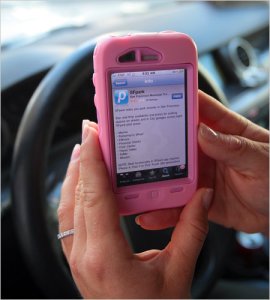Also discussed here: SFpark
And here: Mayor Lee Launches SFpark Project (SFpark News, Apr. 21, 2011)
And here: SFpark overview (3 min video)
The focus today is on an innovative system to be introduced in the summer of 2011 that combines demand-based parking rates with a smart phone app (iPhone to start) that allows drivers to find unused parking spots and the rate charged- thus reducing traffic congestion by 30%, attributable to drivers cruising for empty spots. There is concern that this will distract drivers from watching for pedestrians and other cars and lead to accidents.

Key Quotes:
“With SFpark, San Francisco is the first city in the world to pursue a comprehensive parking-based approach to congestion management and greenhouse gas emission reduction that will also support local merchants and keep San Francisco moving.”
“The SFpark web site provides customers the ability to see parking availability and cost before heading out the door. The mapping tool on the home page shows location, high, low or medium availability and rate information for SFpark garages and on-street parking spaces.”
“The SFMTA will adjust rates based on demand to find the lowest hourly rate possible in each pilot area to achieve the right level of parking availability to make parking easier. Rates will be adjusted no more than once a month and only in small increments of no more than $0.50 per hour. The goal of these pricing adjustments is to have at least one open parking space on every block at most times and parking garages that rarely fill up”
“It could be really distracting.. Most people are looking for parking spaces in places that have a lot of traffic and a lot of pedestrians.”
“drivers looking for parking in a particular 15-block district in Los Angeles drove an estimated 950,000 miles a year, equivalent to four trips to the moon”
“In pilot areas, meter pricing can range from between 25 cents an hour to a maximum of $6.00 an hour, depending on demand. During special events, such as baseball games, hourly prices may temporarily increase beyond the $6.00 ceiling.
Related articles
- SFpark (lennyesq.wordpress.com)
- SFMTA Launches SFPark to Much Fanfare and Political Support (sf.streetsblog.org)
- The Right Price for Parking, San Francisco's SFpark Smart Meters (laughingsquid.com)
- Phone app, website aid search for parking in S.F. (sfgate.com)
- Real-Time Parking Data Now Available Through SFPark App, Drivers Now Have a New Reason to Poke at iPhones (sfist.com)
- Parking: S.F. releases details on flexible pricing (sfgate.com)
- San Francisco parking revolution inches closer (sfgate.com)
- SFPark (eschatonblog.com)
- First test of expanded parking meter hours launches in the Marina (sfgate.com)
- San Francisco Launches iPhone Parking Scheme, For a Price (cultofmac.com)

No comments:
Post a Comment